Economic Justice
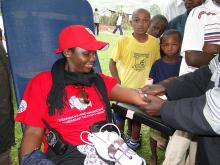
This week, the Senate will vote on H.R. 2354, an appropriation bill that will determine the amount of funds we allocate for poverty-related development assistance. There are a number of amendments proposed that will severely cut this aid, which currently helps millions of the world's poorest and most vulnerable. The bottom 1 percent, if you will.

A (usually) twice-daily round up of news related to Sojourners commitments to social justice and the poor.
Organized Labor Will Continue Standing With Evicted Protesters. Sentamu Hits Out At Greed Culture Of Fat Cats. Does Immigration Fuel Crime? Without Statistical Consensus, Rhetoric And Fear Reign In Debate. Occupying History. Faith Plays Role In Occupy Wall Street Sense Of Morality. Immigrants And English Acquisition. People Reject National Banks, Want To Go Local. OpEd: On the Rise in Alabama. Why the Religious Right Can’t Seem to Get the Candidate It Wants. A New Battle For Religious Freedom? Keystone XL Is Delayed — So Where's The Oil Going Now? OpEd: Is Rick Perry’s Zero Foreign Aid Plan Feasible? Desirable?
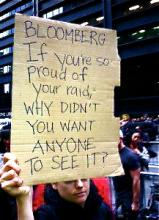
They came at 1 am.
Several hundred police in full riot gear in a precision military operation. They gathered at nearby assembly points out of sight of Zuccotti Park and then simultaneously came trotting out to surround the park like the army scene from The Blues Brothers movie.
Next they handed out fliers and announced by bullhorn that all personal property would be removed from the park, and that it could be reclaimed at a Department of Sanitation garage. Instead, everything was thrown into garbage trucks and crushed by the compactor’s blades. ...
Most of the occupiers were steamrolled out of the park in this manner. Because there was no tent space when I got there I was sleeping on the sidewalk at night, and packing everything back up each morning, so I was able to save everything, but for several items I kept in the OWS kitchen.
A group of more than a hundred Occupiers retreated to the kitchen at the center of the park and chained themselves by their necks to a tree. They were tear-gassed where they sat and were removed by means we have not yet learned of, and we don’t yet know what injuries were sustained.
The Latest News on Occupy Wall Street Under Siege: Judge Allows Occupiers Back In, 5K+ Books from OWS Library Destroyed by Police, Journalists Arrested, Protesters Occupy Church Lot and more. Plus, LIVE STREAMING VIDEO FROM OWS IN NYC inside.
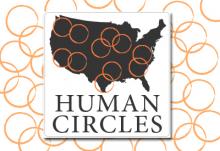
It’s time for people of faith to get up off the couch, out of the pews, and MOBILIZE!
THIS WEDNESDAY Sojourners and other groups in support of the Circle of Protection will coordinate Human Circles of Protection, a national effort by people faith to show congress and the world that Jesus followers want an America where our credo is bond: liberty and justice for all!
According to the Associated Press: The National Lawyers Guild says it has obtained a court that allows Occupy Wall St. protesters to return with tents to a New York City park. The guild says the injunction prevents the city from enforcing park rules on Occupy Wall Street protesters.
More of the latest news on the Occupy Wall Street movement inside.
The New York Times reports:
Mayor Michael R. Bloomberg on Tuesday defended his decision to clear the park in Lower Manhattan that was the birthplace of the Occupy Wall Street Movement, saying “health and safety conditions became intolerable” in the park where the protesters had camped out for nearly two months.
Mr. Bloomberg said the city had planned to reopen the park on Tuesday morning after the protesters’ tents and tarps had been removed and the stone steps had been cleaned. He said the police had already let about 50 protesters back in when officials received word of a temporary restraining order sought by lawyers for the protesters. He said the police had closed the park again until lawyers for the city could appear at a court hearing later in the morning.
Early Tuesday morning, New York City police in riot gear raided the Occupy Wall Street encampment in Zuccotti Park, clearing protesters and arresting more than 150.
Early Tuesday morning, New York City police in riot gear raided the Occupy Wall Street encampment in Zuccotti Park, clearing protesters and arresting more than 150.
UDATE via SanFrancisoGate.com : 10:36 PST OAKLAND -- The second raid of the sprawling Occupy Oakland compound led to the peaceful arrest of 32 people early this morning, and police and city officials called for calm while pledging to support the right to protest.
A legion of law-enforcement officers converged in the predawn hours on the tent city outside City Hall at 14th Street and Broadway. As the sun rose, the camp was dismantled, with officers removing tents and leading protesters away in plastic handcuffs. Other demonstrators, meanwhile, sang and marched on the street as other officers kept watch from behind metal barricades.

Police surround Occupy protest in Oakland Monday morning. Hackers threaten to "remove" Vancouver from the Internet if Occupy demonstrators are moved. Violent fringe is a challenge to Occupy movement. Are sexual assaults being under-reported at Occupy encampments? Popular Hawaiian musician occupies Obama event with a song. Occupy protesters set up camp outside a second UK cathedral. Are Occupiers the new Progressives? And much more news from the Occupy Movement worldwide inside.

It's a clear sign something's wrong when talks on "free trade" turn an island paradise into an armed camp.
Hawaii is on lockdown this week while the U.S. tries to hammer out a regional trade agreement that's being called "NAFTA for the Pacific." While some mean this as a compliment, Hawaii's faith and labor leaders are lifting their voices against an agreement they believe will put profits for banks and corporations above workers' rights, indigenous culture, and local communities. Those leaders are drawing on the Pacific region's indigenous "Coconut Theology" to provide an alternative vision of the common good.
"Coconut Theology came out of our contextual understanding of the Gospel in the Pacific," said Rev. Piula Alailima, pastor of Wesley Methodist Church in Honolulu and a core leader in the community organizing group Faith Action for Community Equity (FACE). "When we break the body of the coconut and partake of the juice, it's a symbol of the body and blood of Christ, of sacrifice, of community and the common good."
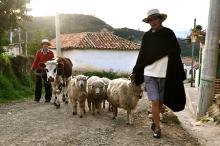
Colombia's campesinos ("people of the land") — peasants, farmers and artisanal miners, the indigenous — are calling out for an end to the exploitation and environmental destruction of their lifelong territories and homes.
They call out for a restoration of their livelihoods. Greed and violence punishing their land is also visited upon the campesinos themselves, leaving them dead, disappeared or disenfranchised as one of the world's largest internally displaced people groups.
The campesinos of Colombia have come together and called out.
Will we listen?
Will we locate our own story in theirs?
Will justice be done? Are we willing to work for it?

As I have read about the Occupy Movement, I have noticed many individual Christians expressing support, but little public support for the movement from the Christian community as a whole.
I have had mixed feelings about this.
Certainly support of the poor, standing up for social justice, most of what the Occupy Movement is about, coincide with what we are called to as Christian people. Yet I think it would be inappropriate for Christians to try to jump into leadership roles when the Occupy Movement is so diverse and when we have so often failed to take a stand on such issues ourselves.
It seems to me that public confession and repentance might be the best way to communicate our support with appropriate humility.
With this in mind I make the following confession as a person of Christian faith. I hope others will join me in this or similar confessions.
Low-income people are likely to spend additional income on food and basic consumer products. This is good for sales. When sales go up, so does hiring.
We don’t have to make a choice between helping low income people and helping small businesses. We can do both.
We all benefit when parents are able to feed and clothe their children.
I believe that there is a basic human dignity inherent in work. In fact, the Bible even makes special provisions to provide jobs for those who otherwise wouldn’t have one. But, when it comes to the messy legislative process, no one can claim God’s special favor on a particular bill. It is, however, appropriate to discuss what kind of moral principles legislation should try to promote.
In St. Paul’s second letter to the Thessalonians, he writes, “Those unwilling to work will not get to eat." Paul goes on to warn about those who are idle and the negative effect they can have on a community. It was essential that every person work for their own well-being and for the health of the entire community.
Hard work was praised by early Christians, but so was ensuring that every person was provided for. Acts 2 says “All the believers met together in one place and shared everything they had. They sold their property and possessions and shared the money with those in need.”
These passages could be pitted against one another. One side argues for strict capitalist principles in which the lazy starve. The other models a communal society that shares and redistributes private property. But understood properly, they actually work together.

Alone, we do not have the power of Christ to forgive sins. But as the church, the body of Christ on earth, we do. I believe there is a seed of our faith that has been planted by the dissident occupiers, towards the forgiveness of debt that was Christ's deep desire for us, so much so that he told us to repeat it in our daily prayer. It's this way that we, by our holy treatment of our community's economic relations, water the seed of faith, until it grows into a sheltering oak, the Kingdom of God.
If our structures, our societies, do not allow us to practice Jubilee, or forgive debt as Jesus teaches, we need to work to change that. Christians must clamor for debt forgiveness. We need to be the voice, as Jesus was, proclaiming Jubilee.
But I don't believe that we are helpless. I believe that we live in an age of peaceful, nonviolent protest where we can carry the witness of Christ's radically forgiving love into the streets.
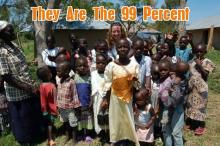
Right now, in cities around the world, there is a growing protest movement putting the issue of economic inequality squarely on the public agenda. Regardless how you feel about this movement, I believe there is another "99 percent" we need the G20 – and urgently Congressional leaders – to remember and prioritize.
Nearly 8 million children under the age of five die every year due to preventable malnutrition and disease. But they are not dying in the United States, Germany or here in France.
According to research by World Vision’s Child Health Now campaign, 99 percent of those entirely preventable deaths take place in developing countries. The 99 percent of the children that die under the age of 5 are too often invisible and don't have a voice at major global summits such as the G20 or in the corridors of Congress. These children constitute the real and too often forgotten 99 percent.

On November 23, the Congressional Super Committee appointed to reduce the national deficit must decide where to cut $1.2 trillion from the federal budget.
Many of their proposed cuts the Super Committee is contemplating strike fear in my soul -- a visceral forboding of injustice.
That's because the proposed billion-dollar cuts will affect after school tutoring programs, job training for unemployed adults, Head Start and child care programs, energy grants that help low-income families afford heat and many other programs that benefit the least of those among us.
It is for this reason that many organizers, parents, students, community leaders and people of faith will assemble across the nation at noon (in every time zone) on November 16 to form human circles of protection around the buildings of organizations and agencies that have dedicated their lives to helping the poor and are in jeopardy of losing essential funding from the federal government.
Whenever we harvest, prepare, and eat food in the context of community, we reenact that wondrous moment on the shores of the Sea of Galilee when Jesus took a few fish and two loves of bread and managed to feed 5,000.
But we can’t forget the whole story — Jesus fed everybody, surely even some folks who despised his message. After all, they were all God’s children, and they were hungry too. I can’t help but think that as they ingested the food, they took in his love too, and it changed them.
Still today, food is a great equalizer and bridge-builder. Who isn’t at least momentarily transformed by a perfect heirloom tomato or a slice of homemade pie?